Auburn University using RFID technology to monitor access to Pat Dye Field
Article body
Auburn University is using radio-frequency identification, or RFID, technology on this season’s football field-access passes to monitor access to Pat Dye Field during home football games.
With the specific guidelines for field access dictated by the Southeastern Conference due to COVID-19, Auburn’s RFID Lab and Auburn Athletics have teamed up to use handheld scanners, floormat readers and antennas in Jordan-Hare Stadium to confirm persons entering the field have met the prescribed guidelines.
“Field-gate workers scan each person’s field pass,” said Justin Patton, RFID Lab director. “The scanner’s screen lets them know if the person has been recently tested. Everyone in close and regular contact with student-athletes, coaches and game officials needs to have passed a recent COVID-19 test to enter the field. It also shows a photo of the person the pass is issued to, so people cannot swap passes.”
RFID technology uses a small, paper-thin tag with an electromagnetic chip that gives an item, in this case a field pass, its own serial number identity, which is detected by a scanner 5 to 10 feet away.
The screening, using the RFID Lab’s proprietary software, is only for persons using field passes, such as coaches, media and others approved under SEC policy to access the field. It does not include student-athletes, who are monitored consistently by their institutions, or fans in the stands.
“RFID is an excellent, added measure to monitor field access. We can track pass holders’ movements on the field and state confidently that we are working with a person who has met policy and they are where we’ve asked them to be during the game,” said Jeremy Roberts, associate athletics director of operations.
During the week prior to a game, Auburn Athletics submits all field passes, including those for the visiting team, to the RFID Lab, which adds RFID tags.
“I believe we are the only school in the U.S. using RFID in this manner,” Patton said. “We encode RFID tags with an ID number and put a tag on each field pass. We do not put personal information on the tag. We compare their ID number with a database.”
The database is pre-generated by the Auburn Athletics operations team and includes information required to meet SEC policy. Patton’s lab adds the RFID tag numbers to the database when placing tags on the field passes.
Patton says an RFID tag on a field pass is like a license plate on a car, which doesn’t contain any information about the vehicle or the driver, but can be referenced in a Department of Motor Vehicles database with vehicle and owner information.
At each game, RFID Lab students set up the system and distribute scanners to field-gate workers who scan the passes. “We have a team of three or four students from our lab helping monitor the scanning at the stadium,” said Blake Silver, RFID Lab project manager.
Thus far, the RFID system has indicated everyone entering the field has met SEC policy. There have been a couple of incidents of people associated with a visiting team who did not have an approved field pass. The RFID scanner detected it was not an issued field pass, so they were not allowed to enter the field.
“The passes were for stadium access but not field access, and we were able to recognize that quickly with the RFID tag,” Patton said. “We can certainly apply this technology in the future as we continue to assist in providing a healthy, safe and secure gameday.”
Persons entering the field also walk across RFID-scanning mats that record when each person enters and exits the field. In addition, antennas are placed around the field so the RFID Lab can see sections of the field accessed by each person.
“This provides more extensive contact tracing should that need arise,” Patton said.
The RFID monitoring system originated this summer when Auburn Athletics asked the RFID Lab to help do an inventory of RFID-tagged gear and clothing.
“We had the idea the RFID Lab could help with field-access monitoring,” Roberts said. “We have worked with the lab in our equipment room, so this has been an extension of that relationship.”
Patton added that RFID was used during graduation in August to help honor new graduates by showing their individual names on the Jordan-Hare Stadium videoboard. RFID tags were placed on name cards that were scanned when graduates walked across the stage.
“The system was connected to the videoboard to display their names,” Patton said.
Patton says the RFID system to monitor limited access areas at other venues will expand to other sports, and events at Auburn and could lead to opportunities for other schools to deploy the system.
Related Media
Media interested in this story can contact Communications Director Preston Sparks at (334) 844-9999 or preston.sparks@auburn.edu.
Auburn University is a nationally ranked land grant institution recognized for its commitment to world-class scholarship, interdisciplinary research with an elite, top-tier Carnegie R1 classification, life-changing outreach with Carnegie’s Community Engagement designation and an undergraduate education experience second to none. Auburn is home to more than 30,000 students, and its faculty and research partners collaborate to develop and deliver meaningful scholarship, science and technology-based advancements that meet pressing regional, national and global needs. Auburn’s commitment to active student engagement, professional success and public/private partnership drives a growing reputation for outreach and extension that delivers broad economic, health and societal impact.







